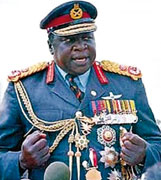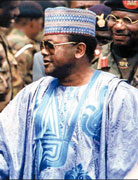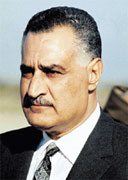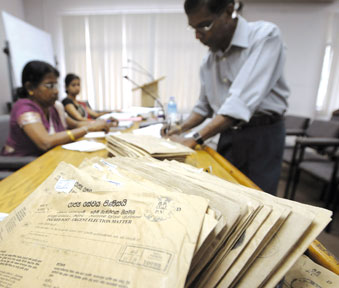Military regimes
A third world phenomenon:
Prof. Wiswa Warnapala Higher Education Minister
 |
|
Idi Amin Dada
|
Military dictator and
President of Uganda from 1971 to 1979
Amin held the rank of Major
General and Commander of the Ugandan Army
Charges:human rights abuses,
political repression, ethnic persecution, extrajudicial
killings, nepotism, corruption and gross economic
mismanagement. |
 |
|
General Sani Abacha
|
Nigerian military leader and
politician
The de facto President of
Nigeria from 1993 to 1998
Accused of human rights
abuses,controlling the press and inconsistent foreign policy
|
 |
|
Gamal Abdel Nasser
|
The second President of
Egypt from 1954 until his death
Led the bloodless coup which
toppled the monarchy of King Farouk
|
The democratic politics in this country began with the introduction
of the adult suffrage in 1931, the consequences of which were many, and
the entry of Sarath Fonseka, who shed military garb a few weeks ago,
into active Presidential politics, has introduced a dangerous element
into the whole process of democratic politics in this country. It
portends a great danger for the very survival of democratic politics;
therefore the magnitude of the political danger needs to be analyzed
from the point of view of the experience of the military regimes which
were a third world phenomenon.
The Opposition, which is in disarray due to the absence of a
leadership capable of coming to terms with the Sri Lankan political
culture, wanted a military man to challenge the incumbent President and
the basis for his selection was the popularity which he commands as a
person who led the Armed Forces. This person, who was in a military garb
a fortnight ago, is now a candidate for the forthcoming Presidential
poll.
Executive Presidency
The Executive Presidency is an institution of Government with
enormous power, and the plenitude of power, which an Executive President
wields on the basis of the 1978 Constitution, is so enormous that the
holder of this office can eventually become an all-powerful dictator,
and this feature, with its plenitude of power, needs analysis in the
context of the emergence of Sarath Fonseka as the so-called common
candidate.
He says that he is an ordinary citizen, in the garb of an ordinary
politician but the fact remains that he donned a military uniform for
more than forty years and carried a gun. He, in my view, still remains a
man trained in the military tradition and derives inspiration from it.
He, because of his vast military experience in the last four decades, is
certain to get himself guided by those traits, and this has been the
experience in all regimes which came to be led by men in uniform.
It is at this point that I propose to examine the current political
scenario in Sri Lanka from the point of view of the experience of
military regimes in different part of Asia, Africa and Latin America.
All military leaders emerged on the basis of the slogan that their
services are required to restore democracy and good governance and
political stability; today Sarath Fonseka, wearing a white national
dress, is making similar rankings along with the entreaties of a divided
and disorganised opposition, which, apart from its common platform for
the purpose of promoting a common candidate, remain utterly confused and
divided.
The whole Opposition is a bundle of contradictions. A common front
cannot be constituted by an Opposition which remains divided on the
basis of ideas and strategies.
No democratic alternative could be built by the Opposition by
promoting a military man, and it is in this context that I would like to
quote C.E.M. Joad, according to whom ‘the life of the citizen of a
democracy is like the life of man, the individual, in the sense that its
successful conduct requires the constant exercise of vigilance and
initiative, the vigilance to ensure that the gains of the past are not
lost.” It is indeed inevitable, a necessity, that people of this country
need to exercise constant vigilance and initiative to prevent the
eventual emergence of a military dictatorship through the installation
of Sarath Fonseka into high office in Sri Lanka.
The military interventions, direct or indirect, have been a
phenomenon in many a third world country, and they became a form of
political intervention in most of the less developed countries (LDCs).
In these countries, in the first ten years after de-colonisation,
charismatic leaders who took over power as the first generation of
leaders in the post-independence period, were ousted by military leaders
in the name of democracy, good governance and stability. Stability and
continuity were treated as major slogans of the military aspirants to
high office. In Sri Lanka, a military leader is being promoted by a
civilian political leadership because of their absolute political
bankruptcy.
The nature of civil-military relations in the developing countries is
a special feature that needs discussion and elaboration as it impinges
on the role of the State in these countries.
In certain countries, there is an unique pattern of civilian control
of the military, whereas there are countries which have been ruled by
men in uniform. In Sri Lanka, the Army began as a small ceremonial Army
which has now been transformed into a professional Army with combat
experience and since independence the Armed Forces were under the
control of the civilian authorities.
Over-estimation
They were never given opportunities to penetrate into the civilian
affairs of the country and it was only in the context of the
humanitarian offensive against the LTTE that it got certain
opportunities to penetrate into certain segments of the civilian life.
Still it was under civilian control, and this is something unique for
Sri Lanka, and no attempt has been made to deviate from the historical
tradition.
The over-estimation of the contribution of the Armed Forces and the
unwanted publicity which the Armed Forces got in the aftermath of the
war created an unwanted impression that the Armed Forces have an
independent role, from which power-hungry and ambitious Sarath Fonseka
would have derived some inspiration. It, however cannot discount the
need for civilian control over the Armed Forces. A military man cannot
be allowed to assume high office as it portends a great danger for
democracy and Constitutional Government.
According to the classical theory in the West, the military is
neither expected or is it oriented to intervene in electoral or
representative democratic politics. It was this tradition of the West
which influenced the role of the Armed Forces in all the countries with
Westminster style of government.
Sri Lanka Army was nurtured in that tradition though an attempt was
made in 1962 to take over power. Most of the elements which were present
in the early sixties are present in the existing political scenario
where the same old forces have begun to play a conspiratorial role.
The common belief is that military emerges in the context of a weak
State, and this kind of analysis is based on praetorian model, according
to which military interventions are characteristically associated with
less developed countries which are described as ‘praetorian societies’.
In such societies, the characteristic feature is the ineffective
political leadership and the absence of instruments to channelise
political support.
 |
|
Voting is a democratic right often
suppressed under military regime. AFP |
According to Samuel Huntington, who formulated the idea relating to
‘praetorian societies’, stated that such a regime is dominated by the
military or by a coalition of the military and the bureaucracy.
This happens in the context of a situation where the civilian
institutions are not strong enough to assert control over the Armed
Forces. In the weak states, there are opportunities for military
domination, and the only instrument available to them is force.
But everything depends on the political and social environment in the
given country. Huntington’s argument was that the rise of military
professionalism resulted in the military take-over of power, and this
thesis has been expanded in Huntington’s work titled ‘The Soldier and
the State.’ Both Huntington and Finer saw some relationship between the
military take-overs and the level of political development.
Praetorian society
Huntington’s analysis about the praetorian society was that its
civilian political institutions are always weak, and it was in this
environment that men in uniform take over power to achieve their own
ends.
This analysis was true in the context of military take-overs in
Africa, but the Latin American experience was linked to the level of
economic development. In most states, there is a casual link between
military interventions and the levels of economic development. There is
yet another argument; military groups exert considerable social and
political influence in a society - the reason for this kind of
development was the fact that military leadership came from the
privileged classes in the country, and this was the case in Sri Lanka
immediately after independence.
The 1962 coup leadership came from the upper strata of the Sri Lankan
society, and they, as a class, resisted the changes that came along with
the political change of 1956. They were largely committed to the
preservation of the old privileges and social relationships.
In other words, they were committed to defend the old social order.
In certain social situations, the Armed Forces largely because of
training and technical competence, maximise their power as patriotic
elements in society; this badge was attached to the Sri Lankan Army
after the demolition of the LTTE.
This, unknowingly, gave them opportunities to penetrate into the
civilian political life, and this I saw as a dangerous development from
which an ambitious man could emerge to taste political power. In this
context, the solution lies in the strength of our own political and
social institutions which still value non-military political secularism.
It would be interesting to examine the role of the Army in Asian and
African countries where they have set up military regimes. A military
dictatorship is a regime where the power resides with the military, and
it is a State directly under the rule of the military.
In the 1960s and 1970s, a large number of third world countries were
plagued with coups and counter-coups; in the subsequent decade there was
some kind of a reversal of this dangerous trend with which many a State
became ungovernable. Certain countries, despite this trend, alternated
between civilian and military regimes.
Military intervention became an important phenomenon in the third
world. It would be useful to import the Marxist analysis into our
discussion. Fredrich Engels once noted the divisive and independent role
of the Armed Forces within the State; he, in his work ‘Role of Force in
History’, stated that ‘in politics there are only two divisive forces;
the organised force of the State, the Army, and the unorganised,
spontaneous force of the popular masses’. This, in other words, meat
that an Army has a dual role.
The role of the Army in safeguarding internal security has grown
appreciably, and the Army in the developing countries realises its
supremacy over all other organisations.
For instance, in an economically backward country, an Army represent
the most significant, unique force, having an effective vertical
structure and social and cultural homogeneity. In the Asian and African
countries, the Army is not at all homogenous. In developing countries,
the Army can become a force promoting capitalist or non-capitalist
development and this depends, to a large extent, on the aims of the
given political leadership.
The Armed Forces took over power - in Egypt in 1952, Iraq in 1958 and
1963, Yemen 1962, Pakistan 1958, Burma 1962, Turkey 1960, Sudan 1958,
Nigeria 1966 and Syria 1961. All these countries, in the subsequent
years, alternated between civilian and military regimes.
Ruling elite
The conditions which motivate the Army to take over power varies from
country to country, depending on the nature and ability of its ruling
elite. The take-over of power by the Army is limited to the restoration
of order and stability in a society, and as Edward Shils says ‘military
men are neither businessmen nor civil servants striving for economic
development.’
In other words, their role is very limited and time bound. Without a
political organisation, no military regime can last long; it needs the
support of the masses.
If these factors are not available, they run the risk of taking the
inevitable path of self-destruction. Nowadays the military dictatorships
in the developing countries find it difficult to sustain themselves in
power as they have failed to address the urgent tasks facing these
countries. In certain cases, the military regimes have transformed
themselves into social regimes with mass political base. Still they find
it difficult to come to terms with internal contradictions within the
regimes. In most instances, they have failed to ensure speedy economic
development.
Professional corpraivism
In the early sixties a new wave of military coups took over power in
Latin America, and these regimes in this region resorted to Bonarpartism.
Such regimes were based on a kind of social demagogy. Yet another factor
was the professionalization of the Armed Forces and they, as a result,
began to have a say in various aspects of the State.
The use of Army men to perform civilian and administrative
responsibilities lead to professional corpraivism. In most cases, the
khaki - clad men try to settle the issues among contending politicians.
Mobutu in Congo came on the scene as a saviour in 1965. By 1984, 16
countries in Africa came under military rule; since 1963 coups in the
region averaged three per year.
Military was seen as an instrument of post-colonial governance in the
countries in Africa. Some regimes sought to acquire legitimacy by
presenting themselves as defenders of the nation against foreign
intrigue. There are ideological and stylistic differences between
military regimes, and this was the pattern in Africa. Most military
regimes tend to justify their military interventions on the ground that
their presence was necessary to clear up the mess left by the
politicians.
An excuse
This kind of agenda provided an excuse to military leaders to usurp
power. Many countries in Asia, Africa and Latin America experienced
variants of military regimes, and there is little evidence to support
the contention that military regimes have been more successful and
effective than the civilian counterparts.
In addition, they were responsible for the ‘failed States’ where the
economic record has been extremely poor. Yet another characteristic
feature was the personalisation of power, and this was seen in the
autocracies of Idi Amin, Sani Abacha and Gamal Abdel Nasser whose power
was based on a personality cult.
|



